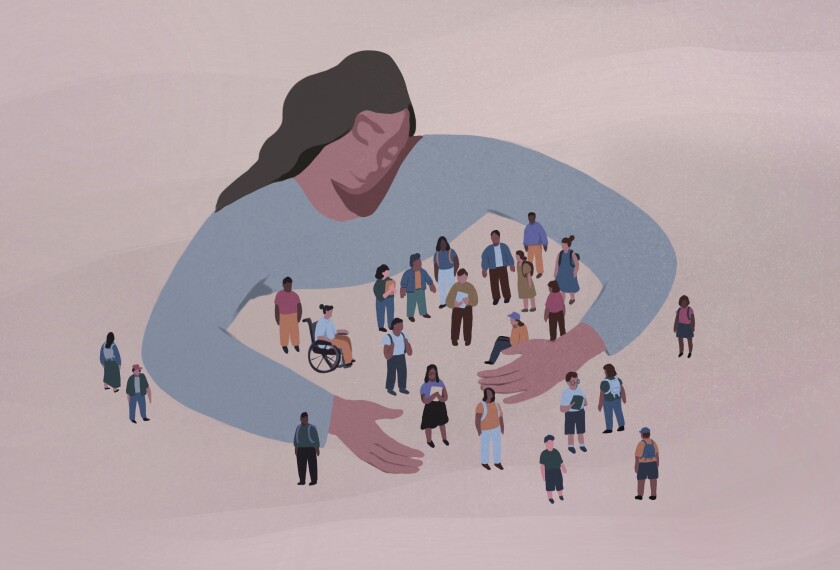In June, I decided to quit teaching. Maybe not forever, but definitely for right now. This was not a decision I came to lightly, and I did not feel triumphant making it. To be frank, I never felt more defeated in my life.
It’s true that I am a statistic. Over 50 percent of teachers leave teaching in the first seven years. Most of those are in the first five years. It was year seven for me.
I told a colleague that I planned on leaving the profession, and he said something that hurt: “Your leaving won’t change anything.” With an emphasis on the anything. It felt like an arrow went through my heart.
In the long run, he’s right, though. That is part of the reason I quit. I know ego drives us all, but I really believed I would make a difference. And I did—for about a dozen or so kids. But there is no way I could have made enough of a difference for enough time and kept my sanity.
It started in June of 2011, when I was chair of the student-support team, which provided extra help for our struggling students. Every day before and after school, I met with administrators, counselors, and teachers. I watched as we denied support services to the neediest students. I saw parents who were well positioned financially use their lawyers to manipulate the system into giving their children unfair advantages: extra time that they hadn’t needed in the classroom on state exams, extended deadlines for homework, and forgiveness from some assignments. I saw too many students and teachers hurt in this process. There were students who could not receive the support they needed because the implementation of response to intervention, or RTI, was too complicated at the high school level.
I told a colleague that I planned on leaving the profession, and he said something that hurt: ‘Your leaving won’t change anything.’ It felt like an arrow went through my heart."
There were teachers frustrated because they were not allowed to require deadlines for homework or essays even when their students had proved they were capable of meeting such standards. I saw lawyers and parents fighting for accommodations because they wanted to prove a point—not because the children involved needed or even used them. I saw so many adults whose primary concern was other than the education or the well-being of children, and so many lawyers and politicians who cared nothing about learning, that I broke. I was disgusted. I gave up the extra responsibility of the student-support team in hopes that I would regain my love for teaching.
My classes were big. If I worked six-hour days with no breaks, it would take 28 days to grade my students’ 159 essays. I was an English teacher. My kids had to write. I had to grade. And I actually enjoyed grading, but 159 students? That was too much. Twenty-eight days to grade those essays was too much.
There is a difference between learning and education. Learning is a slow, disciplined process, while education is about producing results. I didn’t realize it before I stepped into the classroom. I guess that makes me naive.
When I coached the debate team, my kids were learning. They learned about rhetoric, philosophy, policy, government, language, and rigor. I spent many hours making sure they truly understood just how powerful those concepts are. Even that, though, took so much time on weekends, after school, late into the night. And I did it alone. I neglected my family and myself. I gained weight from too much fast food on the way home from school. My responsibility as the sibling of a child with autism was growing. It was time to transition my brother out of my parents’ house, and because teaching took precedence over everything else in life, I felt torn between my responsibility as a teacher and as a sister. I rarely saw my husband and, when I did, I was so exhausted that talk of family was put on hold. Besides, how could I possibly manage to give a child the love she or he needed if I couldn’t even take care of myself? I felt selfish for wanting to have more for myself and my family, when there seemed to be so much need in our schools.
That’s what this boils down to: The needs of my family come first. I have given so much to other people’s families. I have fought hard to always do the right thing. To be honest, after seven years, I’m tired. I can’t do this job half-way. I just can’t. It’s too important. It means too much.
Recently, my husband stood up to his boss and moved to a better company. I guess I did the same thing. Funny, I don’t feel as victorious. I just feel sad and a little angry—not satisfied. This isn’t a decision I am proud of. Some days I question leaving. Maybe I could have found a different school. Maybe I should have to moved to a private school.
On the bright side, I have a new job, and it’s actually a lot like teaching. I educate my clients on their Medicare-supplement and health-insurance options. I still get to serve a group of people, but they are a different group of people.

I believe I will be happier for having quit teaching. I will make more money. I will have more time. I will no longer sacrifice myself for the sake of others’ children. I would like to go back someday when the system finally figures out how lucky it is that people are so dedicated to teaching.
I come from a family of public school educators. I walked away from a profession that I loved dearly. I viewed teaching as a calling. But I lost my faith along the way, and that meant it was time for me to leave.




